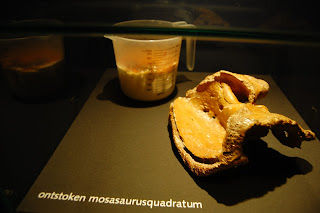 |
| The McFlurry hedgehog |
Eruditorum
A blog about Natural History and Museums
Tuesday, 28 May 2013
Dead Animal Day
This saturday, May the 25th, the Natural history Museum in Rotterdam was dedicated to "de dag van het dode dier". The day of the dead animal.
This wasn't a particularly sinister event, rather more a celebration of animals that have found a second life in the museum. The ´animals with a story´ took center stage, but there was also attention for the regular collection. The museum is after all full of dead animals.
Tuesday, 26 February 2013
Modern Nature
If one follows the intended path through the museum, instead of scooting to whatever exhibit strikes one's fancy as I did, this is the last of the thematic exhibit areas.
The focus here is clearly regional, emphasising the specific nature of the province of Limburg. The first part is preoccupied with unusual species; wolves, lynxes and boars. These are clearly the biggest attention grabbers, but there are some nice displays in the current nature section as well.
The focus here is clearly regional, emphasising the specific nature of the province of Limburg. The first part is preoccupied with unusual species; wolves, lynxes and boars. These are clearly the biggest attention grabbers, but there are some nice displays in the current nature section as well.
Tuesday, 19 February 2013
The brown museum
There are two ways to get to the 'brown museum', if you take the regular route you are presented with this peculiar room at the end of your tour. As a desert, or an afterthought.
But it is perhaps better to enter it from the opposite end.
After hanging up your coat, instead of walking back towards the entrance to enter the museum from the 'proper' direction you can move forward. Taking a right at the coffeeroom you find yourself at the foot of a wooden stairway that leads directly to the brown museum.
But it is perhaps better to enter it from the opposite end.
 |
| Het bruin museum (The brown museum), click to enlarge. |
Friday, 15 February 2013
The Mosaleum Part 2, Mosasaur Bones
After death the mosasaur sank to the bottom of the sea, where it was scavenged before being covered in sediment and fossilizing. Most of the skeleton was scattered, but the skull and much of the spine has been found.
The bones in the Mosaleum in fact preserve evidence of being scavenged in the form of bitemarks. Beyond the bitemarks, there is also further evidence identifying the culprits.
 |
| Bitemarks, indicated by arrows |
Tuesday, 12 February 2013
The Mosaleum
The Mosaleum (a contraction of Mosasaur and Mausoleum) is the last resting place of Bèr, a very large mosasaur discovered in 1998. You can just make out his skull in the middle.
The Mosaleum is a glass building situated just outside the main building of the NHMM in Maastricht, because it is completely made of glass it lets in a lot of natural light.
The mosasaur in the "Mosaleum" is a large Prognathodon, that was given it's own species name saturator in 2002. And it's big, at 14 meters it's among the biggest of mosasaurs.
 |
| The Mosaleum seen from the outside |
The Mosaleum is a glass building situated just outside the main building of the NHMM in Maastricht, because it is completely made of glass it lets in a lot of natural light.
The mosasaur in the "Mosaleum" is a large Prognathodon, that was given it's own species name saturator in 2002. And it's big, at 14 meters it's among the biggest of mosasaurs.
Saturday, 9 February 2013
A 66 million year old infected bone
Wednesday, 6 February 2013
Mesozoic marsupial from Maastricht
For such a spectacular find the NHMM isn't giving us much to go on. Just a tiny, tiny tooth and a small reconstruction. No explanatory text, labels or anything.
Good thing I came prepared. I had brought "De Nederlandse Dino" with me so I could finish it on my two hour train ride. As it happens the last chapters are on other Cretaceous finds, like this critter.
Good thing I came prepared. I had brought "De Nederlandse Dino" with me so I could finish it on my two hour train ride. As it happens the last chapters are on other Cretaceous finds, like this critter.
That black speck.. that's it.
The label clearly isn't much help here. The tooth is simply labelled 'mammal tooth' and the rat-like thing besides it doesn't even get it's own label. You might be surprised to hear it's from the Cretaceous. Good thing I read the chapter on this critter beforehand.
Subscribe to:
Comments (Atom)


